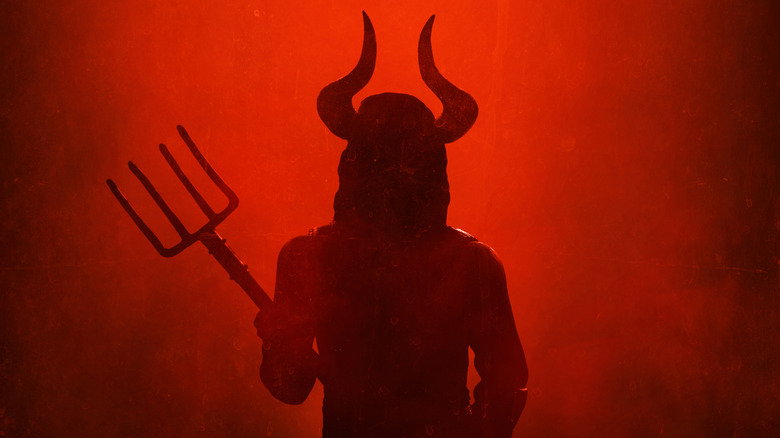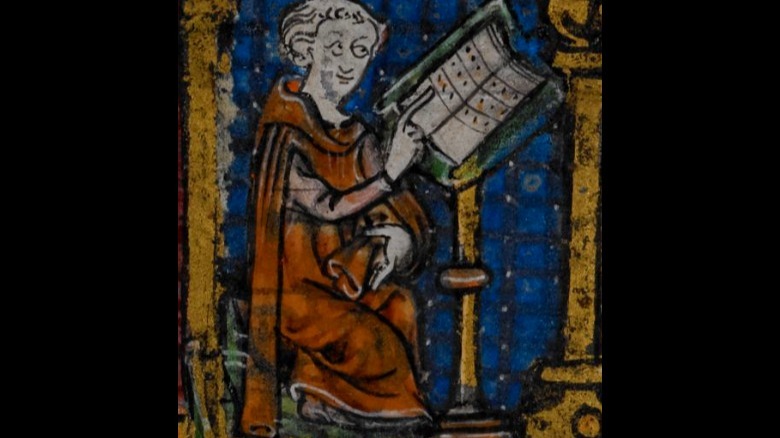Why St. Theophilus Of Adana Is Said To Have Sold His Soul To The Devil
Folklore is chock-a-block with stories of people who have made deals with the devil. For example, as the Rock & Roll Hall of Fame notes, blues musician Robert Johnson is rumored to have stood at a crossroads in Mississippi and exchanged his soul with Old Scratch for his musical talent. Similarly, the 1936 short story "The Devil and Daniel Webster" tells the story of a farmer who sold his soul to the devil, then lawyered up and got it back thanks to the legal skills of Daniel Webster who, by the way, was a real person (though obviously fictionalized for this story).
As a morality tale, a deal with the devil serves as a metaphor for someone who gets in over their head, at great personal risk. The literary and philosophical worlds even have a term for this: a "Faustian bargain" refers to the character of Faust (go figure) who, according to Germanic folklore, sold his soul to the devil.
Considering that the devil is the antithesis of God in Christianity, you would think that Christian clerics would know to stay away from this type of thing. You'd be wrong: folklore has it that at least one Christian saint sold his soul to the devil. And while verifying whether or not he made a deal with a supernatural entity is a bit outside of our lane, St. Theophilus of Adana was a real person and a real saint.
Theophilus of Adana was real
Theophilus of Adana was almost certainly real; or at least, we can say that he was real with about as much certainty as we can with any other historical figure from this time period. Catholic Online claims that he was real, as does the book "Curious Myths of the Middle Ages," although the former source is abundantly clear that much of what is "known" about him is less fact and more legend. It's not certain when he was born, but he ministered in Adana in what is now modern-day Turkey, and he died in 538. His feast day is celebrated on February 4.
Leaving the world of verifiable (mostly) historical fact and entering that of legend and folklore, the narrative surrounding Theophilus is that he was offered the role of bishop of his community, but, according to myth, declined the job out of humility, as Faust.com reports. However, when the new bishop failed to offer Theophilus a suitably high-ranking position, he allegedly contacted a wizard, who got him into contact with Old Nick, who promised the cleric the bishopric if he would only renounce Christ and the Virgin Mary, and sign the contract in his own blood. It worked (allegedly).
Inspiring the Faustian legend
Some number of years after serving as the Bishop of Adana thanks to his deal with the devil, Theophilus started to have second thoughts and, in particular, worry about his eternal soul, according to Faust.com. By contrast, the narrative provided by Catholic Online seems to suggest that his repentance was immediate. Either way, Theophilus was now stuck with a contract he couldn't get out of, and Daniel Webster wouldn't be born for another some 1200 years, so he did the next best thing: he prayed and confessed (and, according to Faust.com, called upon the Virgin Mary, fasted, and then fasted some more). Eventually the actual bishop burned the contract, and Theophilus was free. Do note that there are multiple variations of this story, of which we've provided only the basic general structure.
Theophilus' was evidently the first tale of a deal with the devil (at least, in Christianity), and it inspired the entire concept, including the tale of Faust himself, that is now known as the Faustian bargain. And what's more, Faust was also real, although, again, history is one thing, legend is another, and backing up the latter with history and science is going to be a fool's game.


